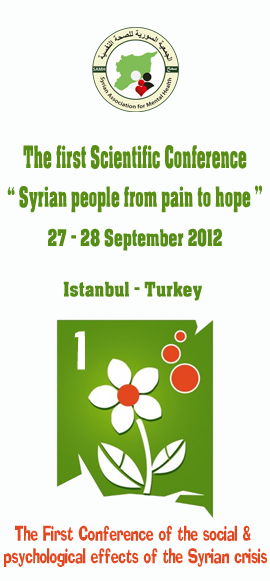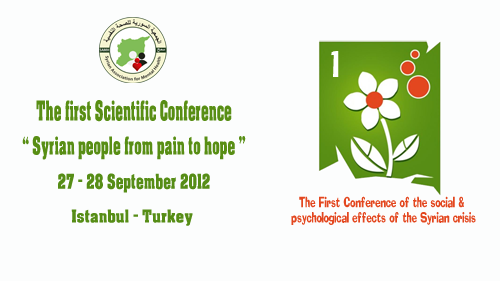

- Summary:
On the 27-28 September 2012, a group of Syrian mental health professionals,
including psychiatrists, psychologists and clinical social workers, met in Istanbul,
Turkey for a two-day conference entitled: The psycho-social effects of the Syrian
uprising and ways to deal with them. The aim of this first conference was to address
the psychological consequences of the current conflict in Syria.
- The Report:
The first Annual conference was organized by a couple of organization including the Sham Human Association, the Syrian Expatriates Medical Association of (SEMA) and the World Association for Muslim Psychologists on Thursday and Friday, 27-28 September 2012, in Istanbul, Turkey.
- Objectives of the first conference:
1- Highlighting the psychosocial problems resulting from the Syrian revolution, current and in the future, focusing on special groups such as (children, women, older persons ...).
2. Identifying competent psychiatrists, psychologists and social workers interested in the Syrian affairs, and coordinating their efforts.
3. Establish a mechanism for unifying the competent field efforts of the psychosocial workers.
4. Developing specialized psychosocial support programs for the Syrian people at present and in the future, and train required specialized teams.
5. Deliver training workshops in psychosocial support.
- The conference sessions dealt with the following topics:
1. Introductions to the psychosocial consequences of crises and disasters.
2. The current psychosocial status of the Syrian people.
3. Children at the time of crisis and disaster.
4. Developing geed psychosocial services.
5. Psychosocial support and treatment in crises and disasters.
6. Previous experiences in psychosocial support in disasters and crises.
7. Psychosocial research in the services offered to the Syrian people.
8. Physical and sexual abuse, and their effects.
9. Training workshops in psychosocial support and treatment.
- Final recommendations of the Conference:
1) Establish and support mental health centers and clinics, fixed and mobile, to serve all groups in need, at home and abroad.
2) Establish direct communication means (such as hotlines, electronic consultations, etc.) to provide psychosocial counseling.
3) Establish psychosocial support projects for the Syrians at home and abroad, to serve all sections of the society, focusing on women, children, the elderly, the wounded and people with special needs.
4) Facilitating the access of psychosocial staff to the affected areas, at home and abroad.
5) Spreading the awareness of psychological effects of trauma and disasters, and to educate people on how to cope with the pressures resulting from crises.
6) Making intensive campaigns addressing countries (people and governments) hosting Syrian people to promote solidarity and to facilitate decent living conditions (eg health, education, residence ...).
7) Making intensive campaigns to highlight the positive aspects of the Syrian revolution, and spread a culture of optimism, and promote psychosocial health.
8) Coordinating with international organizations expertise in the field of psychosocial support in order to benefit from their expertise in implement such projects.
9) Collecting and studying the legal issues related to psycho-social aspects of wars and disasters.
10) Supporting psychosocial studies and surveys related to the Syrian crisis.
11. Emphasize the importance of documentation of physical, psychological and sexual violations against the Syrian people.
12) Holding training courses for preachers, imams, and clerics from all denominations and activists on the psychosocial aspects in order to help dealing with disasters and crises.
13) Train trainers who can train psychosocial workers, at home and abroad.
14) Follow-up this conference with regular psychosocial scientific meetings, symposia and conferences in order to follow up any developments in this area.
15) Encouraging other different professionals to establish specialized bodies and entities to deal with the current and future needs of the Syrian society (eg engineers, lawyers, economists ...)
16) Establishing a database of all specialists in psychiatry, psychology and social work interested in the Syrian affairs.
17) Working toward establishing a specialized medical and psychosocial reference body to oversee the establishment, implementation, follow-up and evaluation of the proposed psychosocial programs at this stage of the revolution and beyond.